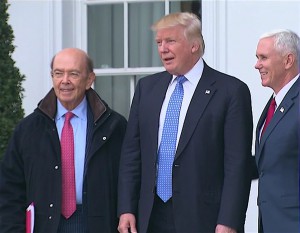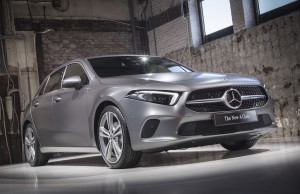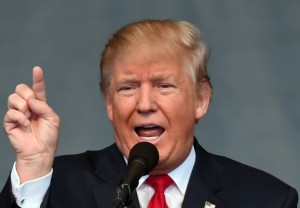
President Donald Trump instructed Commerce Secretary Wilbur Ross, left, to determine if auto imports are a threat to national security.
The Trump administration’s decision to launch a complex investigation to determine if the import of finished vehicles and automotive components represents a threat to national security brought a swift reaction from carmakers and other groups.
The Alliance for Automobile Manufacturers in Washington D.C., the industry’s principal lobbying group in the U.S. Capitol, said the investigation launched by the U.S. Commerce Department under Section 232 of the Trade Expansion Act of 1962 is a process that has rarely been used and traditionally has not focused on finished products.
“We are confident that vehicle imports do not pose a national security risk to the U.S. Last year, 13 domestic and international automakers manufactured nearly 12 million vehicles in the U.S. The auto sector remains the leading exporter of manufactured goods in our country,” the Alliance noted in a statement.
“During the last 25 years, 15 new manufacturing plants have been launched in the U.S. – resulting in the creation of an additional 50,000 direct and 350,000 indirect auto jobs throughout America – and new plants are on the way. We urge the Administration to support policies that remove barriers to free trade and we will continue to work with them and provide input to achieve that goal,” the Alliance added.
(Trump auto tariff threat triggering backlash. Click Here for the story.)
Volkswagen, the largest German automaker, also commented on the investigation. “The Volkswagen Group has made significant long-term investments in the United States that would be impaired by restrictive changes to trade. We believe that increased tariffs will make the auto industry in the United States less competitive, threaten job growth and result in higher prices for consumers,” VW said in a statement.
In addition, the potential for escalating trade retaliation presents a serious risk to economic growth in all countries. With particular regard to the importance of the automotive industry, and as part of a global company with an enthusiastic outlook for operational growth in the United States, it is our hope that ultimately policymakers will find a more productive way to address concerns about trade relations, VW said.
Toyota took a similar tack as it rejected the basis for the administration’s 232 investigation.
“We share the Administration’s goal of growing U.S. jobs and the economy. Toyota has been a significant contributor in this regard, with 1,500 dealers, 136,000 employees and our 11th U.S. plant coming soon, totaling over $23 billion invested in America over the past 60 years. We believe free and fair trade is the best way to create sustained growth for the auto industry and provides more choices and greater value for American consumers,” Toyota said in a statement.
Toyota added the Section 232 investigation is intended to cover threats to national security. Given the global nature of the automobile industry, and the fact “that last year nearly 12 million vehicles were manufactured in the U.S., such a determination seems implausible.”
(Click Here to see more about the UAW’s support of Trump’s tariff plan.)
Germany’s Federation of the Automotive Industry (VDA) noted that German carmakers employ some 36,500 people in the U.S. and extensive network of German company building parts for manufacturers employ 80,000 more.
“An increase in tariff barriers should be avoided,” the body said, saying it had “always spoken out in favor of mutual reductions in tariffs and for free-trade agreements,” VDA said.
German carmakers exported 494,000 vehicles to the US last year, the VDA said, while the Chambers of Commerce and Industry (DIHK) calculated autos and parts accounted for 28.6 billion euros, or $33.6 billion, of Germany’s 111.5 billion euros in exports to the U.S.
Trump – whose protectionist platform helped put him to the White House – has repeatedly floated the notion of steep tariffs that would shield the U.S. auto industry.
The administration did pick up the support of UAW President Dennis Williams, who said he believed the U.S. had been getting “the short end of the stick” on trade. However, Williams directed most of his hire at Mexico and the North American Free Trade Agreement, which has fostered unfair competition since Mexico and its labor unions cooperate with carmakers to keep wages low.
(To see more about China cutting tariffs on imported vehicles, Click Here.)
As part of the NAFTA negotiations, the Trump administration has called for companies operating auto plants to raise wages to $15 per hour from the current level of $2 to $3 per hour.


